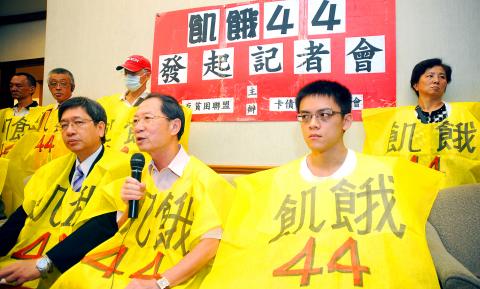Activists from the Anti-Poverty Alliance, which comprises 13 civic groups, held a press conference at the legislature in Taipei yesterday urging legislators to address the problem of the widening disparity between rich and poor in Taiwan.
They also announced plans for two 44-hour hunger strikes that will begin on Sunday.
Anti-Poverty Alliance representative Chien Hsi-chieh , a former Democratic Progressive Party lawmaker, said the gap between rich and poor is expanding in Taiwan, just like in the US and Europe.

Photo: Liu Hsin-de, Taipei Times
Taiwan’s economic growth rate last year was 10.8 percent and labor productivity increased by 16 percent, but wages decreased by 11 percent, the alliance said.
It said the total income of employees accounted for only 44 percent of GDP, which was lower than in many other countries.
Twenty-five people from Taiwan were listed on Forbes’ latest list of the world’s richest people, and the wealth of the top 10 richest people in the nation has increased from US$30 billion to US$40.7 billion, Chien said.
However, there are about 1.04 million workers in Taiwan who receive less than NT$20,000 per month, he added.
He also questioned why the government gave preferential treatment, such as a sales tax exemption, to banks but not to other sectors, and said mounting frustration over the plight of the average wage earner would express itself as it had in recent weeks on Wall Street.
“Occupy Wall Street is not a single incident, but is spreading around the world,” Chien said.
Chien said the alliance would hold two “44-Hour Famine” hunger strikes to raise awareness about the unfair distribution of wealth in the country, with workers not receiving their deserved share.
The hunger strikes will take place in front of the legislature. The first will run from Sunday to Tuesday and the second will run from Tuesday to Thursday.
The groups will also protest against the government giving tax relief to enterprises when the working poor are becoming poorer, and they want to experience poverty through fasting.
Chen Fang-yu (陳方隅), a representative from a group called “Young people want to be rich,” said that about one-fourth of young people in their 20s work as dispatch workers or as hourly wage workers, often with low incomes, long working hours and no welfare benefits.
He said with incomes so low and housing prices high, “who still wants to get married and have children?”
Lin Yung-sung (林永頌), an attorney who advises victims of credit card debt, said some workers are only paid about NT$20,000 per month and had to pay between NT$4,000 and NT$5,000 per month to labor dispatch agencies.
Lin said that as many as 1.04 million Taiwanese — or 15 percent of the working population — earn less than NT$20,000 a month.
That means there are 220,000 more people in that income group than in 2008, at the height of the global financial crisis, Lin said.
The alliance said unemployment and low incomes were the roots of poverty and called on legislators to amend the Statute For Consumer Debt Clearance (消費者債務清理條例), regulations on student loans and the Housing Act (住宅法) during the current legislative session.
The alliance also voiced support for the “Occupy Taipei” rally that is scheduled for Saturday outside Taipei 101.
Additional reporting by CNA

The Grand Hotel Taipei on Saturday confirmed that its information system had been illegally accessed and expressed its deepest apologies for the concern it has caused its customers, adding that the issue is being investigated by the Ministry of Justice Investigation Bureau. The hotel said that on Tuesday last week, it had discovered an external illegal intrusion into its information system. An initial digital forensic investigation confirmed that parts of the system had been accessed, it said, adding that the possibility that some customer data were stolen and leaked could not be ruled out. The actual scope and content of the affected data

‘LIKE-MINDED PARTNER’: Tako van Popta said it would be inappropriate to delay signing the deal with Taiwan because of China, adding he would promote the issue Canadian senators have stressed Taiwan’s importance for international trade and expressed enthusiasm for ensuring the Taiwan-Canada trade cooperation framework agreement is implemented this year. Representative to Canada Harry Tseng (曾厚仁) in an interview with the Central News Agency (CNA) said he was increasingly uneasy about Ottawa’s delays in signing the agreement, especially as Ottawa has warmed toward Beijing. There are “no negotiations left. Not only [is it] initialed, we have three versions of the text ready: English, French and Mandarin,” Tseng said. “That tells you how close we are to the final signature.” Tseng said that he hoped Canadian Prime Minister Mark Carney

POSITIVE DEVELOPMENT: Japan and the US are expected to hold in-depth discussions on Taiwan-related issues during the meeting next month, Japanese sources said The holding of a Japan-US leaders’ meeting ahead of US President Donald Trump’s visit to China is positive news for Taiwan, former Japan-Taiwan Exchange Association representative Hiroyasu Izumi said yesterday. After the Liberal Democratic Party’s landslide victory in Japan’s House of Representatives election, Japanese Prime Minister Sanae Takaichi is scheduled to visit the US next month, where she is to meet with Trump ahead of the US president’s planned visit to China from March 31 to April 2 for a meeting with Chinese President Xi Jinping (習近平). Japan and the US are expected to hold in-depth discussions on Taiwan-related issues during the

President William Lai (賴清德) yesterday bestowed one of Taiwan’s highest honors on Saint Vincent and the Grenadines (SVG) Ambassador Andrea Clare Bowman in recognition of her contributions to bilateral ties. “By conferring the Order of Brilliant Star with Grand Cordon on Ambassador Bowman today, I want to sincerely thank her, on behalf of the Taiwanese people, for her outstanding contribution to deepening diplomatic ties between Taiwan and SVG,” Lai said at a ceremony held at the Presidential Office in Taipei. He noted that Bowman became SVG’s first ambassador to Taiwan in 2019 and